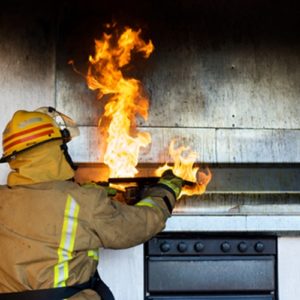
The kitchen is the most common source for house fires. If a grease fire occurs in your home, stifle it with a lid or baking soda.
As an Austin culinary arts program attendee, you spend a lot of time in the kitchen around appliances that produce heat. Not only do you use a stove and oven, sometimes you even break out a blow torch – creme brulee anyone? With all these dangerous heat sources around you, it’s important to know some fire safety tips.
1. Have an extinguisher on hand
Not every situation will call for a fire extinguisher, but it’s definitely a good idea to have one in your kitchen. Store it under the sink and be sure to get a new one every time your current one expires. If you live in a rental unit, many states have laws requiring your landlord to place extinguishers throughout the building. They can often be found in the stairwell or near an emergency exit. In the event that you need to use one, be sure to pull the pin on the handle and then aim the spray at the base of the fire. Squeeze the handle as you make sweeping motions from side to side until the fire is out. Call the fire department afterwards if necessary.
2. Know how to put out a grease fire
According to the U.S. Fire Administration, 48.7 percent of residential building fires and 29.3 percent of nonresidential building fires are caused by cooking. A major contributor to these statistics is grease fires. These occur when the oil you are cooking with becomes too hot and starts to boil. The oil will then catch on fire and you will need to act quickly to put it out. Follow these steps if there is a grease fire in your kitchen:
- Turn off the heat. Do not touch the pot or pan, simply turn the knob to off. If possible, use a metal lid to cover the pot. This will effectively smother the fire.
- When a grease fire is small, you can pour baking soda on it to stop the flames. Larger fires would likely require more baking soda than you have on hand. Use a fire extinguisher if the flames are too large for baking soda or putting a lid on them. It will require a lot of cleanup, but not nearly as much as if your home were to burn down.
- Call the fire department. If you have done all that you can do (or the fire is out of control) get everyone out of your residence and dial 911.
Do not pour water onto a grease fire. This will cause the oil to splash, spreading the fire and possibly injuring you. Don’t try to move the pot as you may spill fiery oil and make the situation worse. If you cannot handle the flames, leave the building and call emergency services.
3. Shut the door
If you go to check on a souffle only to discover upon opening the oven door that it is on fire, your first step is to close the door. This will cut off the flow of oxygen. If the flames do not go out immediately, call the fire department. The same rules apply to the microwave, except you should also unplug the appliance from the wall. Never use a device that had a previous fire problem unless it has been inspected by a technician. They can figure out what the problem was and make sure that the situation will not reoccur. It’s a good idea to use a hood or fan above your oven if you are planning to work with extremely hot oil or if you are purposefully charring ingredients. This will keep the air circulating and take the kitchen temperature down a few degrees. If a fire occurs, however, you’ll need to turn these off as they would only fan the flames.

